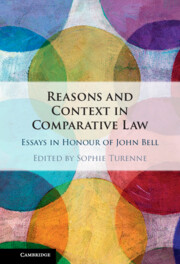Book contents
- Reasons and Context in Comparative Law
- Reasons and Context in Comparative Law
- Copyright page
- Contents
- Contributors
- Foreword
- Preface: John Bell
- Acknowledgements
- 1 Introduction
- 2 What Can Law Schools Offer Other Disciplines?
- 3 Examining Vicarious Liability Comparatively
- 4 What’s in a Name?
- 5 ‘An Art Obscured with Difficult Cases’
- 6 Observations on the Reform of the French Law on Contractual Interpretation
- 7 Assessing (Divergent) Legal Development
- 8 Roundabout Law
- 9 A Comparative Reflection on Chilean Economic Torts
- 10 Judicial Identity Crises
- 11 Researching Judicial Cultures in the European Union
- John Bell’s Principal Publications
- Index
5 - ‘An Art Obscured with Difficult Cases’
Interpretation and Rhetoric in Fulbecke’s Direction
Published online by Cambridge University Press: 27 April 2023
- Reasons and Context in Comparative Law
- Reasons and Context in Comparative Law
- Copyright page
- Contents
- Contributors
- Foreword
- Preface: John Bell
- Acknowledgements
- 1 Introduction
- 2 What Can Law Schools Offer Other Disciplines?
- 3 Examining Vicarious Liability Comparatively
- 4 What’s in a Name?
- 5 ‘An Art Obscured with Difficult Cases’
- 6 Observations on the Reform of the French Law on Contractual Interpretation
- 7 Assessing (Divergent) Legal Development
- 8 Roundabout Law
- 9 A Comparative Reflection on Chilean Economic Torts
- 10 Judicial Identity Crises
- 11 Researching Judicial Cultures in the European Union
- John Bell’s Principal Publications
- Index
Summary
This chapter explores the influence of the rhetorical tradition on the early modern common law of interpretation. It focuses on William Fulbecke’s A Direction or Preparative to the Study of the Lawe (1600), a guidebook that instructed law students on principles of legal interpretation. Fulbecke was writing at a time when interest in interpretation was particularly intense, but his discussion is striking for its unusual sophistication. The chapter argues that Fulbecke’s account was strongly influenced by works on rhetoric, the art of speech and persuasion. Fulbecke was a pioneering comparative lawyer, and would have known that rhetoric was often used to aid interpretation by lawyers of the ius commune. The chapter demonstrates that rhetorical ideas also pervaded the English law of interpretation. Their influence is clear in Fulbecke’s work: Fulbecke aimed to set out a clear method of legal interpretation for beginners, based on the rhetorical works that students encountered at school and university. This chapter broadens our understanding of the relationship between the common law and the rhetorical tradition, demonstrating the importance of understanding the history of English law in its wider intellectual context.
- Type
- Chapter
- Information
- Reasons and Context in Comparative LawEssays in Honour of John Bell, pp. 94 - 122Publisher: Cambridge University PressPrint publication year: 2023

